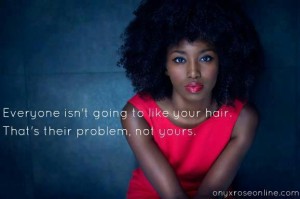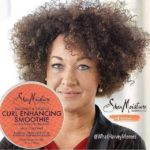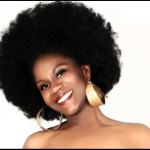A short while ago, I wrote about nappy hair haters. One of my main points was that when Black women hate on nappy hair – it’s usually more about the hater than it is about the woman wearing her hair in a natural style. Black people living in Western society have a lengthy history of being taught to resent and despise each other.
So when Sistas with perms hate on someone like Lil Mama for wearing Afro – yes it’s mean and hurtful. But it’s also part of a pattern of learned behavior.
I think that analysis applies to this situation. You know the situation I’m talking about right? The one where Gabby Douglas kicked butt in the London 2012 Olympic Games. Where she made history for Black women everywhere. At 16 years old.
Instead of focusing on the beauty of this preciously wonderful moment – a lot of Sistas ran to tweet about how terrible her hair looked. In detail. Like it offended them personally that Gabby couldn’t manage to simultaneously soar through the air – and keep her hair from doing what it naturally does when Black girls start to sweat.
To quote one eloquent facebook poster, remind me again of how awesome your hair looked when you made history? Right.
But this is not about defending Gabby and calling her haters on the carpet. This is about understanding what motivates so many Sistas to race to get in line so they can tear down another Sista because of her hair.
Now before we dive in – there are some who say that this is a “non-issue.” Gabby herself has expressed some confusion about the controversy, saying:
“I don’t know where this is coming from. What’s wrong with my hair?” said Douglas, the first U.S. gymnast to win gold in team and all-around competition. “I’m like, `I just made history and people are focused on my hair?’ It can be bald or short, it doesn’t matter about (my) hair.”
Some feel that by exploring the topic we are making it a bigger deal than it actually was. Respectfully – I disagree. The reason this issue struck such a chord is because most of us (i.e. Black females) have experienced some form of teasing, hurt feelings or public shame due to “bad hair” days.
Yes, women of all colors have bad hair days. But Black hair is tied to a history where our hair was used against us as part of racial terror campaigns. There is a hard and fast legacy and history of hair related emotional wounds that came from outside of the Black community. Sadly, many within the community adopted these ways of thinking and the wounds persist.
I dedicate this post to the folks who perpetuate these wounds from within our own circles. Yes, Gabby-Hair-Haters: I’m talking to you.
Hurtful History
As noted here by Ingrid Banks, an Associate Professor of Black Studies at UC Santa Barbara,
“Black women have the right to ‘criticize’ their own on a number of issues, but I view the criticism of Gabby Douglas’ hair as a form of ‘aesthetic violence’ that occurs within black communities [and] has deep historical roots dating back to the late nineteenth century [when] black people equated ‘proper grooming’ standards as a weapon in the fight against segregation. The criticism of her hair is historical in nature, yet it illustrates, in a painful manner, how black people continue to hold on to outdated ideas that are no less problematic today as they were in the past.”
Black hair is frequently motivation for “tear-your-sista-down” day. We’ve known about this for generations but a lot of us first recognized it after the Doll Test.
The Doll Test was a study designed to evaluate the impact of racism on Black kids that was conducted during segregation. Sadly, a lot of people have no idea what the Doll Test was all about. Even more startling is the fact that most of us don’t have a clue as to how the Doll Test mentality is relevant to Black cultural esteem today.
Suffice it to say, if you do not understand the Doll Test findings – then your ability to understand why Black people reject Black hair, en masse, is severely limited.
In fact, it wasn’t until I understood the Doll Test that I could begin figuring out why my friends and I grew up hating our hair. And why the Black hair haters seem to be everywhere – even watching the Olympics.
Starting Out Early
In the 1940s, Black psychologists Kenneth Bancroft Clark and Mamie Phipps Clark created a test to study the psychological impact of segregation on Black children. Their study consisted of a simple experiment. They used four plastic dolls that wore diapers. The dolls were completely identical except for their color. They showed the dolls to Black children between ages three and seven years old and asked them a variety of questions in order to evaluate their racial perception and preferences.
Nearly all of the children could easily identify the dolls by race. When asked which doll they preferred, the majority of the Black children selected the White doll. The majority of the Black kids attributed positive characteristics to the White doll and negative characteristics to the Black doll.
When asked to identify the doll that was smart, nice, or pretty, they pointed to the White doll. When asked to point to the doll that was dumb, mean or ugly, they picked the Black doll.
In a subsequent portion of the test, the Clarks gave the children outline drawings of a boy and girl. They asked the children to color the figures the same color as themselves. Many of the children who had dark complexions chose White or yellow crayons to color the figures.
The Clarks’ study demonstrated that prejudice, discrimination, and segregation caused Black youth to develop a sense of inferiority and self-hatred. When society places a higher value on Whiteness and a lesser value on Blackness, children, whether White or Black, are going to adopt those values. Once they do, they will apply those values to their assessment of their own worth and the worth of the people around them.
Even though the initial study was done in the 1940’s, the findings have not changed much over time. Think I’m exaggerating? Go to Youtube.com and search for Doll Test. See how many recent examples there are of people who are recreating the study over and over again. (Check out this video on Youtube for example. The whole video is great but the Doll Test segment starts at about 3:25.)
When asked to point out the nice doll, Black children who take the doll test today still pick the White doll.
When asked to identify the smart doll, they pick the White doll.
When asked to point to the pretty doll, they pick the White doll.
But when the questions are reversed, the responses are too. When asked to point out the mean doll – Black children today still pick the Black doll.
When asked to find the dumb doll, Black kids still point to the Black doll.
When asked to point to the ugly doll – you can sometimes see the look of sadness on their face as their little fingers still reach for the Black doll.
The doll that looks most like them.
By the time our children hit kindergarten, they have been firmly entrenched in messages that let them know all Blackness was not created equal; that all hair is most certainly not good hair. They learn Black people with lighter skin and straighter hair get better treatment and command more social value than Black people with darker skin and nappier hair.
It’s not just Black children either.
CNN reporters Anderson Cooper & Soledad O’Brien recently featured reports on the Doll Test – only this time the study also evaluated racial concepts in White children. Just like their Black counterparts, White children who take the doll test demonstrate a clear sense of racial bias. Just like Black children, most White kids learn to see Blackness as inferior to their own White skin. Unless someone teaches them otherwise, they begin to accept the stereotypes about Black people as truth.
So what does all of this have to do with Gabby and the Sistas who chose to stomp all over her victories because of her hair?
Everything.
The Doll Test study shows that when you are surrounded by a racist value system, you will in all likelihood internalize the messages inherent within those values. Which means that on average, utterly innocent Black kids learn how to hate who they are as they simply interact with the world around them.
Since slavery, Black kids have been indoctrinated with social messages that say the lighter your skin – the luckier you are. The straighter your hair – the prettier you are. The darker you are – the worse off you are. The nappier your hair – the uglier it is.
Guess what happens to most of those kids when they grow up and get a twitter account?
Hopefully, they are fortunate enough to read some books, take some classes or encounter something or someone that proactively teaches them to love who they are. Think of this as a self-hatred intervention – a period in your life when someone introduced you to the history and truth about Black people. A time when you learn to accept yourself as full of infinite and divine potential. A time when you learn to value yourself and your people the way that other communities and people do.
But if those kids don’t get that experience, they can become self-hating adults who find fault with anything and anyone who even closely resembles what they were taught to hate. These kids learn to despise their own reflection.
They gather on playgrounds using words like “African booty scratcher” in order to make fun of other Black kids. They use jokes that start with “yo mama so Black…” and find it funny.
When they grow up, they rush to their social media platforms with comments about another Sista’s hair, skin, nails, clothes or whatever else they can identify as something they should despise. Like Gabby. And her nappy roots.
I’d be willing to bet that most of the Sistas who took their hatred for Black hair out on Gabby are in this later bunch.
Where Do WE Go From Here?
I’m a fan of the statement that says, “one of the hardest things to do is to love a people who were taught to hate themselves.”
Because it’s true. Slavery and a White supremacist governing structure required that the slaves and slave owners believed that Black people (and our hair, skin, lips, noses, etc.) were inherently inferior. After Emancipation – the governing structure did not change and racial terror did not end. In many ways it got worse. Do the words anti-lynching campaign or Black Wall St. ring a bell?
At no point have Black people in general and Black women in particular been able to find a space where we could heal from the psychological trauma that we experienced. And that traumatic history is on full display when the only thing many of us can focus on during Gabby’s historic feat – is her hair.
Now that we’ve identified the problem, stay tuned for part 2 where we’ll talk about the need to fall deeply in love with ourselves – and our hair. In my opinion, no matter how many boycotts we have, marches we walk in, campaigns we run and movements we start – there will be only be minor improvements in the overall state of our community until we learn how to love our selves first.
Everything else is just window dressing. Sort of like slapping a perm on nappy hair and calling it “straight.” It doesn’t matter how straight our hair looks – if our minds are still trapped.





This is a MUST READ. You hit it right on the nail. It’s always sad to see moments like this recent Gabby-Hair-Haterade. But as you eloquently put it, people who hurt people are just hurting people who were hurt by other hurting people. So it’s a cycle forged through centuries of “learned” self-hate. Black-on-black crime is what it was. This was a great post.
Amen! The Biblical principle says “out of the abundance of the heart, the mouth speaks,” and I guess it goes for bad as well as good issues. Fortunately, you didn’t continue the cycle by going negative on the naysayers.
Thank you, for your powerful words. It is so hard to believe we are still dealing with the same ignorant attitudes of our grandparens’ past. Whether it is black on black hatred, others on black, women on women, and etc…. When will people begin to see that beauty is from within, and not outward. We are not meant to agree and look like each other. That it pure beauty of being an individual.
Smooches,
@MicheleH_SWS
Sista, I feel what you’ve outlined here, very insightful. I would, however, like to take what you’ve said a step further. If this is about “Loving your Black/Brown self” in all of our forms we cannot exclude women who perm, color, weave, straighten their hair from this conversation about loving who you are in the right now of today. What has been so beautiful about the Natural Hair Movement has turned very ugly in such a short time. Now, natural hair sista’s are “real” and perm, straight, weaved hair sista’s are “fake”. No, we are all REAL Black/Brown women. I want my sista’s to love me because I am None Greater Than the sum of OUR Existence! I am not better or worse because I wear my hair natural. I am a proud, loving, genuine Black woman.I’ve been natural for years and I’ve never hated OTHER women who are not. I need not degrade them or belittle them for their hair chooses. But somehow a movement which was meant to seek pride and foster a sense of self and beauty in the face of Western standards of beauty and White supremacy has spawned Black hatred against Black women once again. That is to say, If the Natural Hair Movement is about discovering Love (love of self, blackness-unique Black beauty), why does hate language still pro-veil in the natural hair community? I believe it’s because of your central point in the above peace, Self Hatred. If my sista has blonde hair down her back, why should/would I hate her. If I feel like she’s misguided, shouldn’t I love her even harder? Why would I judge her, belittle her?
This issue is deeper than the aesthetic of a Black woman (hair, ETC…), it’s about trying to analyze, catalogue and assign a look, fashion, role, duty, identity to all Black women. Every Black woman does not have to have natural hair, every Black woman does not have to wear fill in the _________ (blank). We are all unique Black/ Brown women and we deserve the opportunity to express that. I am not negating the presence of western cultural aesthetic and value on Black women. Of course that is present, alarmingly so. I posit that belittling, abusing and ultimately betraying your sista’s because of the way we look is rooted in hating Blackness in all of it’s forms.
In our quest to define ourselves we have decided to forgo the western ideal of beauty which speaks to the resilience of the African spirit. We are reclaiming our beauty, intelligence, strength and prowess everyday. However, we cannot dismiss those who have not gotten there yet, or those who will never get THERE (Revolutionaries hold tight). If me, loving my Africa roots, culture, features, and life means I hate my African American family, friends, culture. Than I still hate a part of who I am. I am a full, whole Black woman and I need to love all of me, how I am, in the right now of today. I accept myself in order to better myself.
The thing is, we haven’t learned to love our whole self, natural permed, carnivore, vegan, fat, skinny. And because of this natural sista’s hate on weave wearing sista, light skin /dark skin, African/ African America. Yes, White supremacy has laid the foundation to this house of hatred but we have rebuilt that structure time and again. Hurt people do, indeed, hurt people.